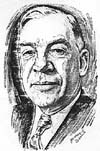

 Charles F. Dalton, born and raised in Springfield, Massachusetts, graduated
from the University of Vermont College of Medicine in 1903 as valedictorian
of his class. In 1904 he began practicing medicine in Burlington while teaching
chemistry and dermatology at the UVM College of Medicine.
Charles F. Dalton, born and raised in Springfield, Massachusetts, graduated
from the University of Vermont College of Medicine in 1903 as valedictorian
of his class. In 1904 he began practicing medicine in Burlington while teaching
chemistry and dermatology at the UVM College of Medicine.
His position as Health Officer for the city of Burlington (1907-1912) and his subsequent appointment as secretary of the State Board of Health (1912) launched his career in preventative medicine. In 1918, Dalton succeeded Dr. C. S. Caverly as secretary of the State Board of Health and professor of hygiene and preventative medicine at the UVM college of Medicine.
Dalton is most remembered as a pioneer of public health and preventative medicine. He helped implement the "Vermont Plan" of post- infantile paralysis care (1914) and authored the Maternal and Child Health Program (1936); both became models for federal programs. He organized medical inspection of schools and summer camps. He established regional health boards under state supervision to replace local town health officers, many of whom lacked medical training.
Though Dr. Dalton served on the Eugenics Survey advisory committee, he seemed less concerned with heredity than with environmental factors in public health programs. Most health problems, he argued, were rooted in ignorance of hygiene, child poverty, and inadequate disease prevention programs. In 1925, when he and Professor Perkins briefed the state legislature on the causes of Vermont's high rate of draft rejections in the World War, Dalton contended that 90% of the reported "defects" found in Vermont men could have been prevented if detected and treated in childhood.
Professor Perkins supported Dr. Dalton's efforts to establish rural health districts, provide routine health inspection of school children, and centralize authority over disease control programs. He included many of Dalton's public health initiatives as integral components of his "Good Eugenics Program for Vermont."
To learn more about Dr. Charles Dalton, the Public Health movement, and eugenics, see:
Blackwell, Lyn. "The Politics of Public Health: Medical Inspection and School Nursing in Vermont, 1910-1923." Vermont History (Winter-Spring, 2000): 58-84.
Pernick, Martin S. "Eugenics and Public Health in American History." American Journal of Public Health 87 no. 11 (1997): 1767-1772.